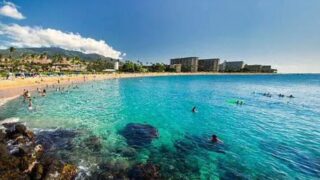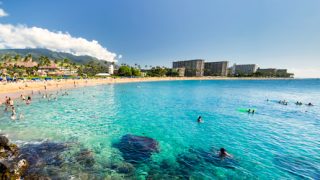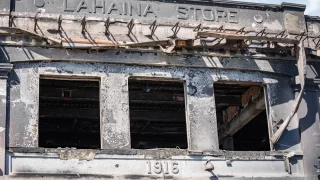Just days ago, we revisited how Maui’s first resort town was once built with housing for the workers who made it run—and how that vision quietly vanished over the past 50 years. But that wasn’t just a history lesson. What’s happening now is even harder to ignore.
Nearly two years after the Lahaina fires, many on Maui still don’t have a stable place to live—not because their homes burned, but because the island they call home has become too expensive to stay in. And for travelers, this wake-up call matters more than you might think.
Maui’s beaches are still stunning. But behind the beauty, many residents now sleep in cars or spare rooms, if they’re lucky. Some never lost a home to the fire, but still lost everything when their job disappeared and the rent doubled. These are the people being quietly pushed out, and travelers rarely see what’s unfolding just beyond the resort gates.
The other side of your Maui stay.
Following the Maui fires, jobs disappeared, rents skyrocketed, and long-term rentals quietly vanished. Now, many who once supported Maui’s tourism economy are paying nearly double what they used to. They squeeze into smaller spaces, crowd in with relatives, or settle for temporary housing far from home.
The new UHERO report confirms it: some residents are paying 80 to 90 percent more for less. And while hotels refill and visitors return, many locals are being priced out of the very communities they once helped sustain.
Can Maui still house its people—and welcome you?
Officials once hoped to convert thousands of vacation rentals into permanent homes. That plan has already been cut in half, and even the smaller version is now tied up in lawsuits that could drag on for years. Maui isn’t building—or converting—its way out of this crisis anytime soon.
For travelers, this means fewer rental options, continued pressure on hotel rates, and a growing sense that the island is reaching its limit.
The return of visitors didn’t fix what broke.
Hotels are refilling. Flights are full again. But for many Maui residents, nothing has been restored. Some say they’ve received little or no help at all, even as federal and local support winds down.
A woman in Kula who lost her job and was priced out of her rental put it bluntly: “They tell us to be resilient. But it feels like we’re being erased.”
This is the part most travelers never see—what’s happening just beyond the resort gates, even as the island welcomes you back.
This isn’t about guilt. It’s about awareness.
No one’s asking you to cancel your Maui vacation. But this moment calls for something more than business as usual travel.
If you visit, know this: Maui is still grieving, even twenty months later—and it shows. Many residents remain displaced. Some will never return to the homes they lost. Others are watching their island change in ways they never asked for.
We know there’s no single answer—and no shortage of strong opinions. But what’s clear is that Maui is still in the middle of something unfinished.
It’s not about skipping the vacation. It’s about seeing the whole picture—and deciding how to be part of it, not apart from it.
How travelers can support Maui’s recovery.
If you’re coming to Maui, you have a chance to do more than visit—you can help. That starts with simple choices: stay in legal accommodations, especially those owned or operated by Maui residents. Eat local. Ask questions. Listen.
If you want to go further, consider supporting trusted local organizations that are helping families rebuild. The Maui Strong Fund from Hawai‘i Community Foundation is providing direct relief and long-term recovery aid. Maui United Way offers grants and essential assistance to families and grassroots nonprofits.
The Council for Native Hawaiian Advancement’s Kākoʻo Maui Fund helps displaced families and supports cultural preservation. And the Maui Food Bank continues to serve those facing food insecurity across the island.
These are not abstract causes—they’re helping the very people who made your favorite Maui memories possible.
Even small choices send a message: that your visit isn’t just about taking, but about seeing, respecting, and giving something back.
Will you still go?
This is the latest reason why your next Maui trip might look—and feel—very different. And we want to hear your thoughts.
Get Breaking Hawaii Travel News







I wonder why the large companies with hotels on the island aren’t constructing affordable housing for their staff. I have no idea how much land costs, but if they can’t get the staff to support the hotel, it seems like they will lose business (aka profit).
We loved coming to Maui- for 25 years.But no more. I feel sorry for the local people who have lost their jobs and have no places to live but that’s because the government too greedy.They have spoiled it for the locals and us too. Garfield.
The harsh reality is that I as a visitor am not to blame for the fire or the lack of rebuilding and housing. Decades of lousy governance and policies do not now become my responsibility to fund and fix. If I am going to volunteer, it will be in my home town. My hard earned vacation time is mine to spend and laying a guilt trip on visitors shoulders is unfair and only creates resentment. Maui is by no means unique in struggling with high housing costs, but its sense of entitlement is astounding.
myself and wife are planning an extended stay in maui sometime from jan 26- apr/26. she hates the cold, we want to enjoy maui again when she is healthy enough (please read between the lines), and want to help the islanders (not the money grabbers). please let me know how to rent a home from a local.
This is horrendous and sad. Just an idea for visitors: when grocery shopping, fill a bag with food to donate to the food bank.
I am sorry that this is happening to our fellow HI residents on Maui, but I am glad to see someone writing about the reality of what people face here. It might open some people eyes and change some of the entitled behaviors.
Maui isn’t the only place in the US that has been affected by fires. Finding ways for tourists to flip the bill isn’t right. East LA and the fires that burned around Malibu left thousands homeless and no homes have been started to be rebuilt. Insurance companies refusing to write or initiate new policies where locations are high risk. What insurance is going to cover these new homes in Hawaii anyway? If they ever do and when the rates would be totally unaffordable. I guess my point is not all American’s are focused on Maui because other places like Malibu California has suffered with way more homes and way more people. Hawaii just needs to fix the problem and move on and quit playing a guilt trip on tourists.